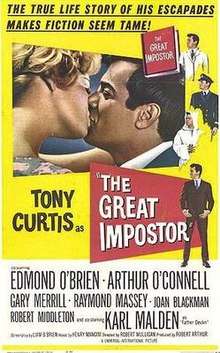The Great Impostor
The Great Impostor is a 1961 movie based on the true story of an impostor named Ferdinand Waldo Demara. The film is loosely based on Robert Crichton's 1959 biography of the same name, it stars Tony Curtis in the title role, and was directed by Robert Mulligan. The film only loosely follows Demara's real-life exploits, and is much lighter in tone than the book on which it is based.
- For The Fleetwoods' song, see (He's) The Great Imposter.
| The Great Impostor | |
|---|---|
 1961 poster | |
| Directed by | Robert Mulligan |
| Produced by | Robert Arthur |
| Screenplay by | Liam O'Brien |
| Based on | The Great Imposter (novel) by Robert Crichton |
| Starring | Tony Curtis Frank Gorshin Gary Merrill Edmond O'Brien Arthur O'Connell Karl Malden Raymond Massey |
| Music by | Henry Mancini |
| Cinematography | Robert Burks |
| Edited by | Frederic Knudtson |
| Distributed by | Universal Pictures |
Release date |
|
Running time | 113 minutes |
| Country | United States |
| Language | English |
Plot
As he is arrested by the Coast Guard on an island in New England, a man born as Ferdinand Waldo Demara but known by many other identities recalls the events that brought him to this point.
Demara quit high school as a boy and joined the Army. He wanted to become an officer, but his lack of education worked against it. On a whim, he fakes a set of credentials and becomes a U.S. Marine.
When his lie is detected, Demara, facing jail, fakes a suicide and hides out as a Trappist monk. After a while, he is expelled from the monastery, captured and imprisoned in a military brig. But the warden inadvertently confides too many details of his own life to Demara, taking a liking to him. Upon his release, Demara impersonates the warden and lands a job working in a Texas penitentiary, where he takes up with his new warden's daughter, Eulalie.
Blackmailed by an inmate who recognizes him from the military jail, Demara once again flees. He joins the Royal Canadian Navy, using the forged credentials of a doctor. After falling in love with a RCN Nursing Sister, Catherine Lacey, he goes to Korea to serve aboard HMCS Cayuga. He ends up doing dental work on the ship's captain, then performing operations in a Korean hospital.
Hailed as a "miracle doctor," Demara gains publicity that exposes his past. The Navy finds out who he really is and intends to hold a court-martial. Nurse Lacey and others vow to testify on Demara's behalf, having seen his good side. Worried about possible disrepute to the RCN, and his stellar service, he is allowed to leave under a general discharge. He then goes and becomes a teacher in New England.
The FBI eventually comes up with an agent whose assignment is to track down the great impostor and capture him. In the end, the agent is revealed to be Demara himself.
Cast
- Tony Curtis as Demara
- Edmond O'Brien as Capt. Glover
- Gary Merrill as Pa Demara
- Karl Malden as Father Devlin
- Raymond Massey as the Abbot
- Joan Blackman as Catherine Lacey
- Arthur O'Connell as Warden Chandler
- Jeanette Nolan as Ma Demara
- Sue Ane Langdon as Eulalie
- Frank Gorshin as Barney
- Robert Middleton as Lt. Brown
- Cindi Wood as WAC Lieutenant
- Gage Clarke as Mr. Warren (uncredited)
Awards
- Nominee Best director - Directors Guild of America (Robert Mulligan)
Reception
A.H. Weiler of the New York Times said: "...the film is not a harebrained exaggeration of the facts. But the story, enhanced by the serio-comic talents of Tony Curtis in the title role, add up to an odd-ball, but engaging, movie. ...Variety, it's been pointed out, is the spice of life, and Demara's life, as presented here, appears to be spicy beyond compare, but the record backs our adventurer fully. ...Suffice it to say that Mr. Curtis, running this gamut of adventures, seriously as well as with a wink, contributes the necessary light touch that makes palatable this derring-do based on factual data."[1]
See also
- List of American films of 1961
- Catch Me If You Can, a 2002 movie starring Leonardo DiCaprio
- The Pretender, a TV series
References
- A.H. Weiler, "The Great Impostor" Mar. 30, 1961 https://www.nytimes.com/movie/review?res=9805E1DD1539EE32A25753C3A9659C946091D6CF